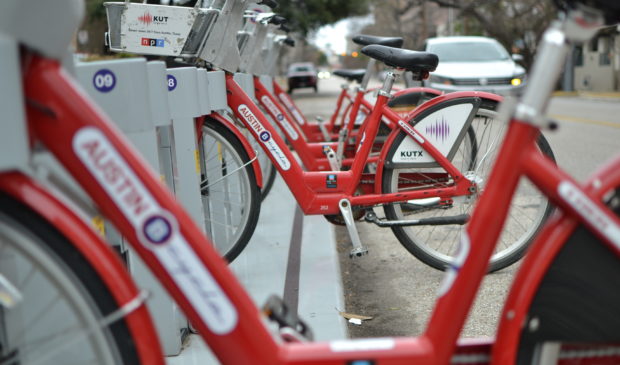B-cycle’s UT expansion a towering success
Friday, March 30, 2018 by
Caleb Pritchard When Austin B-cycle expanded its reach into the University of Texas campus area last month, its executive director predicted it would be a big success. It turns out his expectations were too low.
“Forty days into this, and we’re where we thought we’d be in six to eight months,” Elliott McFadden told the Austin Monitor on Thursday afternoon.
Since Valentine’s Day, when it cut the ribbon on nine new stations on the Forty Acres and the adjacent West Campus neighborhood, the city-backed bike-sharing system has put up eye-popping numbers.
So far, some 7,800 Longhorns have registered for the service. With a pace of 50 to 100 new registrants per day, McFadden estimates a full 10,000 students will be members by the end of the spring semester. Through a pilot program with UT, student membership is free and staff members qualify for a 50 percent discount on the regular $80 annual rate.
Those perks along with the density of residences, classrooms and other destinations have helped the new stations post more than 54,000 checkouts so far. For context, the entire 63-station system saw 23,526 checkouts during the 10 days of South by Southwest this year, a period during which UT, incidentally, was on spring break.
The new stations include four stations in the dense thicket of apartments and new towers west of Guadalupe Street and five on the university campus itself. McFadden said that B-cycle has one truck specifically dedicated to keeping those docks optimally stocked. Otherwise, the bike-sharing service has not had to make significant adjustments in order to keep up with a student population that operates on rhythms that aren’t necessarily in sync with the mostly downtown population B-cycle is used to serving.
“In some ways, it balances itself,” McFadden said. “We do see on weekends that students make lots of one-way trips to downtown,” he added, though whether these are to the new Central Library or some other destination, he did not reveal.
A resolution passed by City Council in February called for another $1 million B-cycle expansion, though McFadden said none of those new stations will land in the campus area. However, he said the success of the UT pilot gives him hope for a greater partnership with the university. (An official from UT’s Parking and Transportation Services was unavailable for comment on Thursday.) McFadden also mentioned that there are at least five other locations on campus where he would like to see new stations. Furthermore, he said there is demand for bike-sharing in the North Campus neighborhood above Dean Keeton Street.
However, the same Council resolution covering the latest B-cycle expansion also directed staff to develop a new dockless pilot program that would introduce to city streets what could be seen as a rival to the station-based model of bike-sharing. St. Edward’s University is currently operating a pilot with dockless company Spin that allows its bright orange, smartphone-activated bikes on the private campus.
Spin is one of several companies that will participate in the Austin Transportation Department’s dockless bike-sharing community forum on Wednesday, April 4. That event at the Central Library starts at 7:30 a.m. and runs until 10 a.m.
ATD will follow the forum with several community listening sessions before briefing Council’s Mobility Committee in June. The dockless pilot itself could go live by late summer or early fall.
Despite that, the city remains steadfastly supportive of B-cycle, a system that it launched with federal help in 2013. On Thursday, David Orr, ATD’s bike-share program manager, hailed B-cycle’s gangbusters performance around UT.
“Improving access to cycling is an important part of the Austin Bicycle Plan, and Austin B-cycle is a critical tool in lowering barriers to riding a bike,” Orr said. “We see this expansion as a key strategy in offering an affordable transportation option for students to get to work, school and career-building opportunities.”
The Austin Monitor’s work is made possible by donations from the community. Though our reporting covers donors from time to time, we are careful to keep business and editorial efforts separate while maintaining transparency. A complete list of donors is available here, and our code of ethics is explained here.
You're a community leader
And we’re honored you look to us for serious, in-depth news. You know a strong community needs local and dedicated watchdog reporting. We’re here for you and that won’t change. Now will you take the powerful next step and support our nonprofit news organization?









